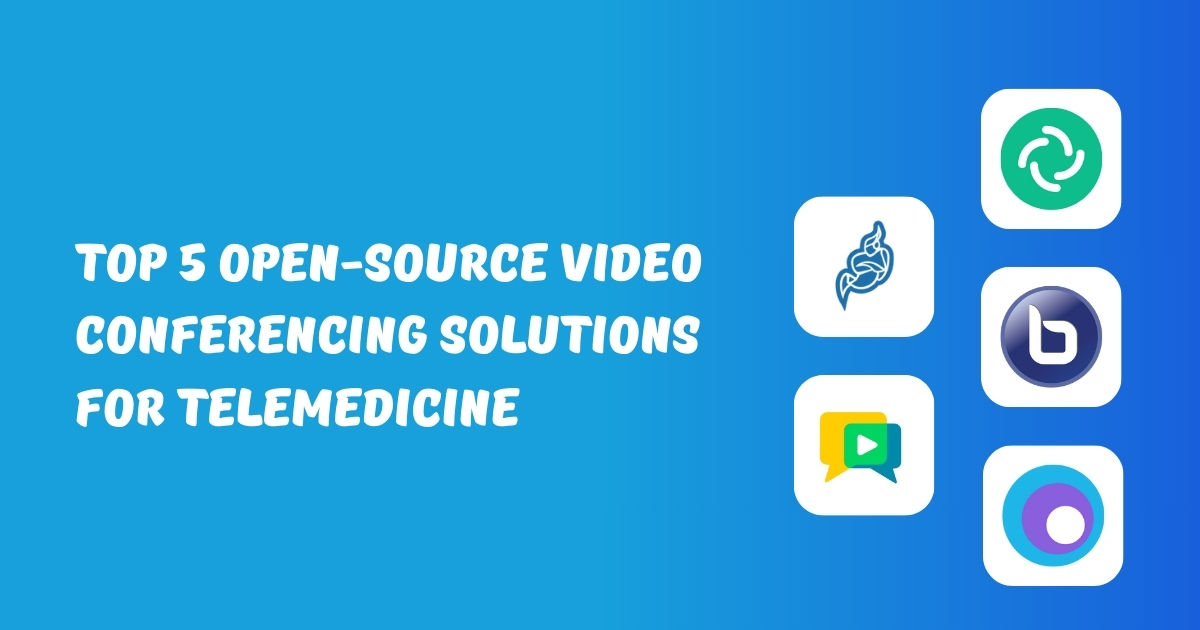Table of Contents
- Why Choose Open-Source Video Conferencing for Telemedicine?
- Proprietary vs. Open-Source Solutions for Telemedicine
- Top 5 Open-Source Video Conferencing Tools for Healthcare
- 1. Jitsi Meet
- 2. BigBlueButton
- 3. OpenVidu
- 4. Mediasoup
- 5. Element (formerly Riot.im) with Matrix Protocol
- Why WebRTC Conferencing Solutions Dominate Telemedicine
- Key Considerations When Choosing a Self-Hosted Solution
- Building Trust in Telemedicine with Open-Source Platforms
- Conclusion
- Next Steps:
In the rapidly evolving world of telemedicine, open-source video conferencing tools are revolutionizing secure, flexible, and cost-effective patient communication. Healthcare providers need self-hosted video conferencing platforms that ensure HIPAA, GDPR, and other compliance standards, while also offering customization and data security.
In this guide, we explore the best open-source video call software and WebRTC conferencing solutions tailored for healthcare.
Why Choose Open-Source Video Conferencing for Telemedicine?
Many healthcare organizations prefer open-source video conferencing platforms because they offer:
- Compliance: Ensure adherence to HIPAA, GDPR, and other privacy standards.
- Data Control: Self-host video conferencing systems to retain full control over patient data.
- Customization: Modify features like EHR integrations, waiting rooms, or encryption protocols.
- Cost Efficiency: Avoid expensive licensing fees from proprietary software.
Proprietary vs. Open-Source Solutions for Telemedicine
| Feature | Open-Source Platforms | Proprietary Software |
|---|---|---|
| Cost | Free or low-cost | Expensive licensing |
| Customization | Highly customizable | Limited to vendor’s features |
| Data Ownership | Full control | Vendor-managed |
| Compliance | Can be configured for HIPAA/GDPR | Depends on the provider |
| Security | Transparent, community-audited | Closed-source encryption |
Top 5 Open-Source Video Conferencing Tools for Healthcare
1. Jitsi Meet
Key Features:
- WebRTC-based, browser-based meetings with no downloads.
- End-to-end encryption (E2EE) and HIPAA-compliant configurations.
- Self-hosted deployment for full data control.
Why It’s Great for Telemedicine: Seamless EHR integration, breakout rooms for consultations, and scalability.
2. BigBlueButton
Key Features:
- Designed for education and telehealth with screen sharing, polls, and recording.
- Self-hosted video conferencing via Docker or AWS.
- Real-time captioning and multilingual support.
Trust Factor: Used by universities and hospitals for its reliability and security.
3. OpenVidu
Key Features:
- Modular architecture for integrating telemedicine-specific plugins (e.g., patient forms, AI diagnostics).
- WebRTC-based with SFU (Selective Forwarding Unit) for low-latency streaming.
- GDPR-compliant with built-in audit logs.
Customization: Ideal for building branded telehealth platforms.
4. Mediasoup
Key Features:
- Ultra-low latency WebRTC conferencing for real-time diagnostics.
- Scalable for large healthcare networks.
- Developer-friendly with robust API support.
Use Case: Perfect for remote surgery consultations or radiology reviews.
5. Element (formerly Riot.im) with Matrix Protocol
Key Features:
- Decentralized, encrypted messaging and video calls.
- Self-hosted deployment for full HIPAA compliance.
- Integration-ready with existing telehealth apps.
**Security Highlight: ** End-to-end encryption by default.
Why WebRTC Conferencing Solutions Dominate Telemedicine
- No Plugins Needed: Runs directly in browsers (Chrome, Firefox, Edge).
- Low Latency: Essential for real-time patient-doctor interactions.
- High Security: Uses DTLS and SRTP protocols to secure video/audio streams.
Additional Benefits:
- Improved patient accessibility (no software installations required).
- Scalable infrastructure for hospitals, clinics, and home-care services.
Key Considerations When Choosing a Self-Hosted Solution
- Data Sovereignty: Ensure hosting servers align with compliance regulations.
- Technical Expertise: Choose platforms that fit your IT team’s capabilities.
- Scalability: Select solutions that accommodate high-patient volumes.
- Interoperability: Ensure EHR, IoT devices, and wearable compatibility.
Building Trust in Telemedicine with Open-Source Platforms
- Transparency: Open-source software allows audits for security validation.
- Community Support: Active developer communities (e.g., Jitsi GitHub) ensure rapid bug fixes and feature improvements.
- Cost Savings: Redirect budgets to patient care instead of software licenses.
Conclusion
For healthcare providers prioritizing security, flexibility, and compliance, open-source video conferencing platforms like Jitsi Meet, BigBlueButton, and OpenVidu provide powerful solutions. By opting for self-hosted video conferencing, organizations can enhance patient trust, improve care delivery, and safeguard sensitive medical data.
📢 Stay ahead in telemedicine with WebRTC conferencing solutions that blend innovation with security!
Next Steps:
✅ Need a customized telemedicine platform? Explore our white-label telemedicine solutions!
Want to integrate secure video calls into your telemedicine? Let’s talk!
FAQ
Jitsi Meet is a leading choice due to its end-to-end encryption, scalability, and EHR integration.
Yes. Jitsi Meet supports self-hosting with HIPAA-compliant configurations, encryption protocols, and private server hosting.
WebRTC is a secure, low-latency, and browser-based solution that eliminates the need for third-party plugins.
Self-hosting ensures data sovereignty, compliance with privacy laws, customization, and cost savings.









